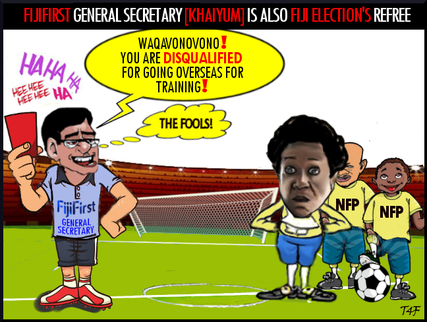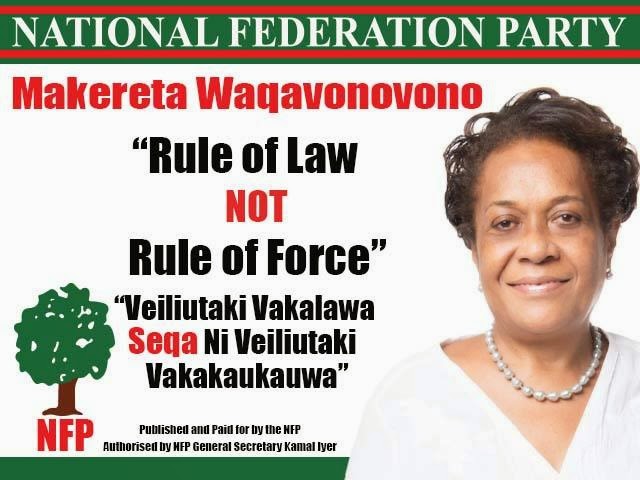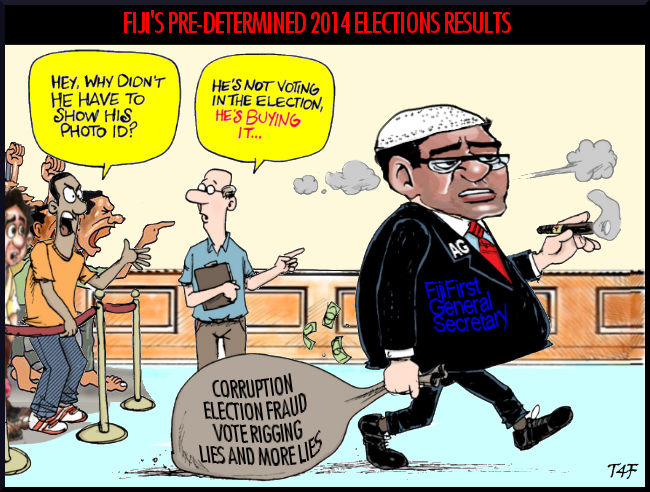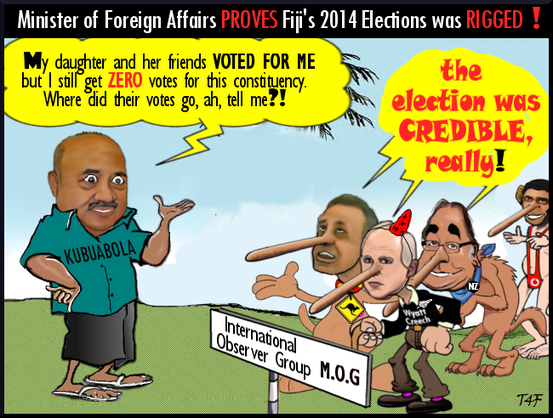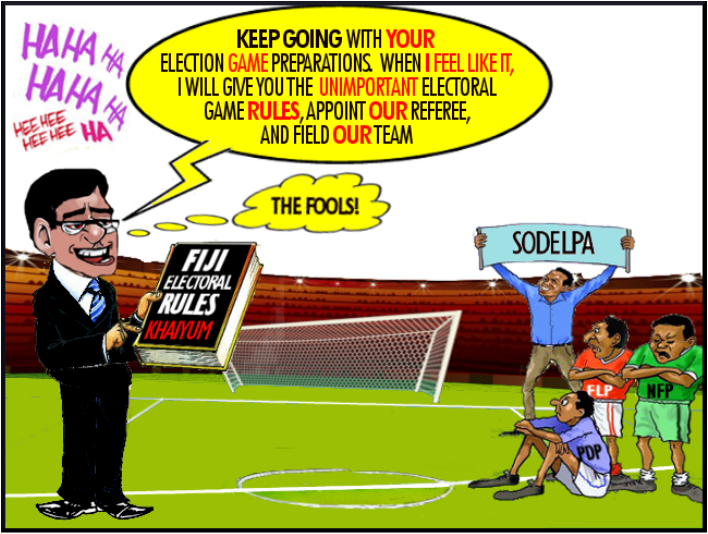"Any deviation from the recommendations would render the 2018 general elections meaningless and may also prompt the NFP to re-consider its participation in the next elections under the current regressive and draconian decrees and constitutional provisions relevant to
conduct of elections."
"We were denied two capable candidates in Ms Makereta Waqavonovono and Mr Jone Vakalalabure on residency qualifications, which require candidates to be ordinarily resident in Fiji for two years. Citizens working or studying abroad cannot be candidates. But those working for Government and serving in peacekeeping missions are eligible to be candidates. This wasn’t the case under the Electoral Act of 1998. What we have now is clearly a case of double standards."
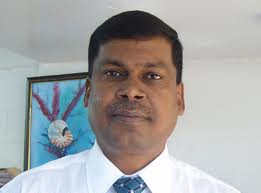
BY NFP LEADER HON PROFESSOR BIMAN PRASAD
Genuine democracy and parliamentary democracy can be achieved to some measure if the recommendations of the annual Report of the Electoral Commission for 2014 and, especially the Report of the Multi-national Observer Group (MOG), which monitored the September 2014 elections, and the Annual Report of the Electoral Commission, are implemented.
Fourteen months after the MOG, Electoral Commission and the Joint EC/SOE Reports were refereed to it by the Honourable Madam Speaker, the parliamentary standing committee on Justice, Law and Human Rights is scrutinising the Reports.
On 15th April 2015, soon after the release of the Final Report of the MOG, the Supervisor of Elections Mr Mohammed Saneem welcomed the findings of the Report in a statement to the media.
A report on Fiji Live stated : -
“Fiji's Supervisor of Elections Mohammed Saneem says the report by international observers on the 2014 election will assist the Fijian Elections in efforts to achieve international best practices and adopt innovation.
Welcoming the 53-page MOG report, Mr Saneem says the FEO will carefully review the report and its recommendations as it prepares for the 2018 election.
"The MOG which was co-led by Indonesia, India and Australia conducted itself in a professional and courteous manner and their insights has been a great benefit to the FEO," Mr Saneem said.
"While the MOG's general endorsement has been known for some time, this report offers useful analysis on special aspects of the election."
Fiji Live – 15th April 2015
It is therefore vitally important that recommendations of the reports be incorporated in any strategic planning undertaken by the Elections Office as part of preparations for the next general elections scheduled in 2018.
MOG Report
This can only happen if Government brings before Parliament, the Media Industry Development Decree, Political Parties (Registration, Conduct, Funding & Disclosures) Decree and the Electoral Decree, to make the necessary changes as recommended by the MOG, to make the next elections credible.
The recommendations contained in the 53-page MOG report are credible and highlights the difficulties and frustrations faced by the political parties, candidates, the media and non-governmental organisations (NGO’s) during the last elections.
On the Media, MOG rightly noted that harsh penalties in the Media Industry Development Decree prevented most media outlets from effectively reporting on election issues.
The contents of the report on Media Environment, Media Industry Development Decree and Media Industry Development Authority (MIDA) also show the ineffectiveness of Media Industry Development Authority.
The MOG rightly recommended the need for regulation as well as an independent institution to prevent and adjudicate on media bias thus ensuring a level-playing field amongst election participants, as well as a review of penalties in the Media Decree.
The fact that the MOG has recommended for an independent institution proves MIDA’s lack of neutrality because it is a body appointed by Government. A free, fair, credible and unfettered media industry in Fiji is rendered meaningless if MIDA continues to exist.
The MOG report also highlights the need for amendment to the Political Parties (Registration, Conduct, Funding & Disclosures) Decree. It rightly points out that the broad definition of a public office holder excludes a large number of citizens from freely participating in the political process. Furthermore the report describes the prohibition on trade union officials from being members of political parties, as a limitation on political freedom.
The MOG has recommended for requirements to be reduced for political party registration as well as allow public office holders and trade union officials to be political party members. This has been the case throughout our Independent history.
The MOG has recommended changes to the Electoral Decree. Most importantly, the MOG notes that the absence of political party identification from the ballot paper and National Candidates List was unusual – the lack of any names, symbols and photographs on the ballot paper.
The MOG also observed that voters were prohibited from bringing "how-to-vote" pamphlets into polling stations and anyone caught breaching this provision faced a hefty fine of $50,000 or imprisonment of a term up to 10 years, or both.
The NFP had made submissions to the Electoral Commission on the need to change the ballot paper to include symbols of political parties and names of candidates.
Section 23(2) of the 2013 Constitution (Bill of Rights) (Political Rights) states, “Every citizen has the right to free, fair and regular elections for any elective institution or office established under this Constitution.”
We firmly believe a ballot paper with numbers denies this constitutional right because it erodes the principle of free and fair elections. We maintain a voter is unable to exercise a meaningful choice in the absence of names and symbols.
Voters recognise political parties by their symbols. The Political Parties (Registration, Conduct, Funding and Disclosures) Decree 2013 requires political parties to set out the symbol of any proposed party. This is re-confirmed in the Decree’s second schedule that outlines the contents of the constitution or rules of a political party, which amongst other things requires the logo and symbol of a party.
The symbol is the identity of a political party and candidates that are sponsored under its banner.
This identification was totally missing from the ballot paper, as was the link between a candidate and his/her nominating party.
This led to promotion of single numbers.
Furthermore, in the last elections, Non Governmental Organisations (NGOs) were denied the right to be election observers. The MOG has recommended for this to change to ensure credibility of the election process; symbols and names of candidates to be included on the ballot paper and the National Candidates List; penalties for election related offences to be reviewed in accordance with international standards and practice; and that Government should review and finalise all existing electoral laws and regulations well in advance of the next election.
If Government truly believes in common and equal citizenry and the protection of fundamental rights and freedoms, it should have no hesitation in accepting the recommendations of the MOG, which observed the elections in strict compliance with Government’s Terms of Reference.
The recommendations have to be implemented to ensure the next general elections are credible, without any perceived or real fear of suppression of fundamental rights and freedoms.
Electoral Commission Annual Report 2014
The Electoral Commission through its Annual Report for 2014 has pointed out that its work was affected by it not having the services of an independent legal advisor. The Commission stated that repeated requests for an independent legal consultant to the Minister of Elections remained unanswered.
This confirms that concerns raised by the NFP as well as other political parties were not appropriately addressed because of the inability of the Commission to seek independent legal advice.
Some of the concerns, after our submissions were rejected, that we raised in writing, in meetings with the Commission, electronically or verbally through phone were: -
- Ballot paper size and visibility of the number, tick in counting stations for counting agents verification.
- Counting result certification by party agents at each polling station.
- Voting guide booklet to include: Candidates listed together by Party: Party symbol against each candidates name and number.
- Polling station venues to be also assigned by maximum walking distance of 1km for each voter.
- Soft copy of polling station voter rolls to be expedited and given to Parties.
- Voter guide booklets to be given to parties as soon as possible or at least 2 weeks before polling.
- Count agents to be able to take pens and pencils to record results during counting
- The non-presence of police just outside count centres. They were instead stationed 50 metres away at polling stations
- Procedure surrounding the announcement of protocol of results.
- Stoppage of announcement of protocol of results
- Non-verification by political parties and certification of the IT system in which results phoned from count centres were entered
The Commission also noted that it was inhibited in fulfilling its role in direction the Supervisor of Elections on matters concerning his performance. The Commission also pointed out that the position of the Supervisor of Elections be re-advertised but was informed by the Minister of Elections of the appointment of Mr Mohammed Saneem.
These are serious concerns that cannot be ignored. The observations of the Electoral Commission clearly point out that the independence of the office of the Supervisor of Elections was compromised before the general elections.
Last year one of the Commissioners Professor Vijay Naidu resigned and also told the media through an interview that the Supervisor was not acting upon the instructions of the Commission.
The Commission also recommends changes to the Decrees and Amendments to the Decrees governing the conduct of political parties and elections. It also recommends changes to the
Constitution on reducing the 5% threshold to 3.5% (Section 53(3) of the Constitution).
We were denied two capable candidates in Ms Makereta Waqavonovono and Mr Jone Vakalalabure on residency qualifications, which require candidates to be ordinarily resident in Fiji for two years. Citizens working or studying abroad cannot be candidates. But those working for Government and serving in peacekeeping missions are eligible to be candidates. This wasn’t the case under the Electoral Act of 1998. What we have now is clearly a case of double standards.
Conclusion
We strongly believe the Standing Committee on Justice, Law and Human Rights incorporate all recommendations of the MOG and Electoral Commission Reports in its Report.
This can then be thoroughly scrutinised and debated in Parliament. The recommendations are too important to be ignored by any Government, especially one that consistently preaches about international best practices, true democracy and common and equal citizenry.
Any deviation from the recommendations would render the 2018 general elections meaningless and may also prompt the NFP to re-consider its participation in the next elections under the current regressive and draconian decrees and constitutional provisions relevant to conduct of elections.
